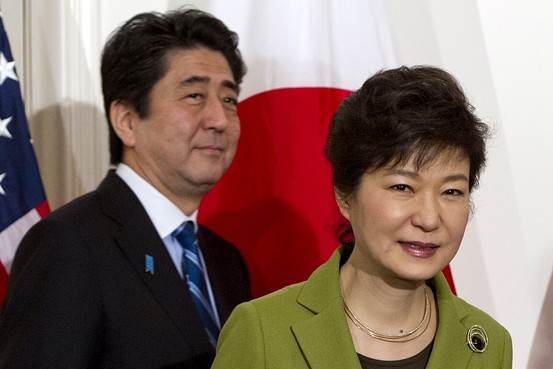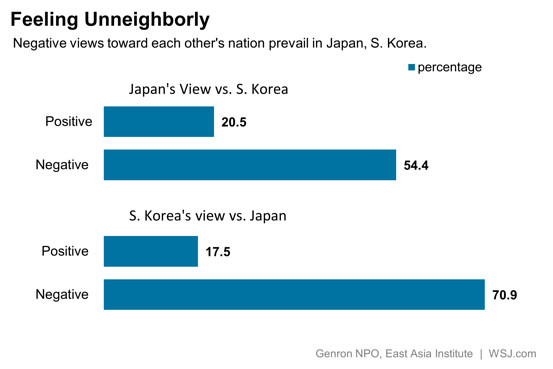Press Release

South Korean President Park Geun-hye and Japanese Prime Minister Shinzo Abe arrive for a trilateral
meeting with U.S. President Barack Obama in The Hague on March 25, 2014.Agence France-Presse
/Getty Images
What a difference a year can make in relations between neighbors.
A new survey conducted in Japan and South Korea showed that public sentiment toward each other deteriorated sharply over the past year as the two countries — both led by outspoken, nationalistic leaders — sparred over wartime history and a disputed island.
According to the two research groups that organized the poll — Genron NPO in Japan and East Asia Institute in South Korea — the percentage of Japanese respondents who said they had a “negative impression” of South Korea surged to 54.4% from 37.3% in last year’s survey. Those who had a “positive impression” of South Korea fell to 20.56% from 31.1%.
In South Korea, 46.3% of respondents said Japan poses a “military threat” to their country, higher than the 39.6% who saw China as a threat. Over three-quarters of the Koreans said they had a bad impression of Japanese prime minister Shinzo Abe. Overall, 70.9% in Korea held a negative views toward Japan, compared with 76.6% in 2013.
Over a half in South Korea described Japan as a “militaristic” nation, while nearly half in Japan labeled Korea a “nationalistic” society.

The stark results jibe with the rocky relations between the two countries over the past few years. Even as Washington prodded its two East Asian allies to get along, Tokyo and Seoul have fought bitterly over so-called “history issues,” including the treatment of wartime sex slaves and visits by Japanese leaders to a contentious Tokyo shrine that honors convicted war criminals. Since they took office over a year and a half ago, Mr. Abe and South Korean President Park Geun-hye haven’t been able to sit down together for a summit meeting.
The respondents from both countries blamed their diplomats. In Japan, 54.8% said diplomatic ties between the two governments weren’t functioning well, while 38.5% in Korea gave the same assessment. Well over three-quarters in both nations said the two leaders should have a summit meeting, although in Korea, a majority said its government shouldn’t rush into such a meeting.
The survey shed light on a big gap in the ways the two sides view the difficulties between them. Asked why they held negative feelings toward the other nation, 73.9% in Japan pointed to South Korea’s “persistent criticism” over history issues. In Korea, 76.8% felt the Japanese lacked “correct repentance” for its invasion and colonization of the Korean Peninsula.
All is not lost in the relationship, however. Despite the animosities, many respondents from both nations were eager to visit each other’s country, with 60.9% of Koreans and 41.6% of Japanese expressing such desires.
The research groups gathered roughly 1,000 written responses each in Japan and South Korea for the survey, which was conducted in June.